Interview with Ruben Verborgh
Solid: taking back the Web through decentralization. App development as we know it will radically change

Ruben Verborgh will give a talk about Solid: taking back the Web through decentralization. App development as we know it will radically change at FOSDEM 2019.
Q: Could you briefly introduce yourself?
The way apps currently work on the web is deeply broken: they compete mainly on who harvests the most data, not on who provides the best experience or innovation. This has consequences for developers, who are unwillingly dragged into this rat race, and end users, whose privacy and potential is limited.
I will talk about the Solid ecosystem, the latest project by web inventor Tim Berners-Lee. We advocate for a different way of building apps that is better for everyone.
Q: What do you hope to accomplish by giving this talk? What do you expect?
I’ll explain to people how Solid will bring back the Web we love through decentralization. I will zoom in specifically on what will change for developers, and aim to make developers enthusiastic about making their first steps in the Solid world.
I expect a critical audience with an open mind 😄
Q: How did you get involved with the Solid project?
A technological match, and an ideological match. My research of the past few years focuses on the technologies that enable Solid: Linked Data and the Semantic Web. And I share the concern of Tim and many others about where the web is going. It’s not too late to make things right again.
Q: Decentralization is about choice: where you store your data, who you give access, and so on. But, as the success of centralized social networks shows, apparently very few people find it important to make their own choices and they just use these centralized services because it’s what everyone does and it’s convenient. How do you convince this majority to take a look at a decentralized but less convenient system like Solid?
Asking that question is answering it: we need to make Solid as convenient.
However, we should not take existing social media as a measure of success; by doing so, we’d set the bar to a fixed point and still miss it. We need to aim higher. Solid enables ideas beyond the boundaries of any single social network. It’s so convenient not to be bound by anything. If mp3 had only worked on one audio player, it wouldn’t have been successful either.
Q: Decoupling apps and services from data is a powerful concept behind Solid’s vision, but it changes the business model of online services radically. For instance, centralized social networks earn money because they have a monopoly on their users’ data. How would a decentralized social network earn money?
Through innovation.
So many companies today are playing a data harvesting competition—even those who are not in the data business. This is insanity. Companies should focus on their core strengths and technologies. Data needs to become an enabler of innovation again—it is the oil, not the engine.
Q: Suppose I’m sold to the idea of Solid and I want to create decentralized apps for the platform. Where do I start? Do I need to know RDF? What libraries and frameworks are available to develop Solid apps?
Come see my talk 😉
And you can find a hint in a recent blog post I wrote.
Q: What does the Solid project’s community look like? How can interested developers contribute? In which domains could you use some help?
The Solid community is diverse, but we want it even more diverse. We don’t just need technologists of all corners of society and the world, we also need artists, designers, lawyers, writers, content creators… Solid is an ecosystem for all of us.
Q: Which new features can we expect this year in Solid?
A brand new developer experience that makes writing decentralized apps a blast.
Q: Have you enjoyed previous FOSDEM editions?
Can you believe this will be my first? I’ve been wanting to go for such a long time. but you’re always scheduled against other conferences. This time, I have no excuses anymore. See you there!

Creative Commons License
This interview is licensed under a Creative Commons Attribution 2.0 Belgium License.